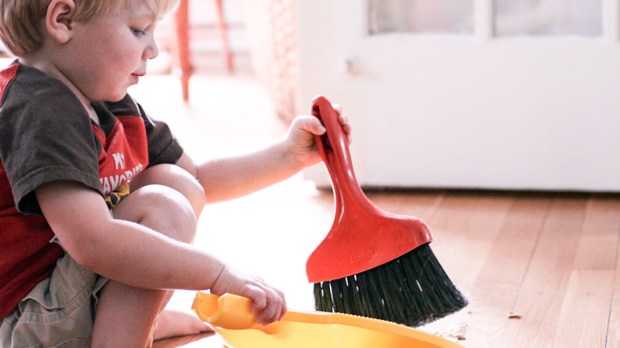How many times have I stubbed my toe on the step-stool in our kitchen? More times than I can count. In at least a few instances, the contact was solid enough that the exclamation emerging from my mouth later had to be taken to confession.
The stool, you see, is often dragged into random positions in the kitchen by our 2-year-old. She needs to be tall enough to reach the countertops to do her chores. Not that we assign our two-year-old many chores. All she must do each day is put her shoes away and brush her teeth before bed. That’s not enough for her, though, so she creates her own chores. If I sweep the kitchen floor, she sweeps with me. If her mother rolls dough for a pie, she also rolls dough for a pie. If her sister washes dishes, she washes dishes.
That last one is particularly disastrous (as you know if you’ve ever witnessed a toddler washing dishes). I may as well open all the kitchen windows and spray a garden hose in through them. Once she’s done helping, we have to mop up the pools of water on the floor, change her wet clothes, locate and remove all the dirty dishes she’s put into the cupboard, and then actually wash the dishes. The stool often remains right there by the sink until I wander in for a midnight snack and stub my toe on it.
Our eldest daughter is now 14 years old. At one time, she was that clumsy toddler helping mommy do chores in the kitchen, making a mess with pancake batter and dropping porcelain bowls onto the floor while trying to put them in the cupboard. Just as with her little sister, we cleaned up the mess and thanked her for helping, never mentioning that the job had become three times longer. Now that she’s older, when she helps out around the house, she truly is helpful. Often, she pitches in without even being asked. She simply likes to do it. It’s what she’s always done.
Now, I’m not going to pretend that all our children do their chores willingly. For a few of them, chore time is still a full-on domestic battlefield. We’ve had our share of tears and yelling, but for the most part, the kids do their chores willingly and with a minimum of fuss.
I don’t know that we’ve cracked a secret code, exactly, but there are a few underlying principles to helping children take on the responsibility of chores without too much complaining.
Let them help from a young age
When they’re very young, children want to do exactly what they see their parents doing. They love to imitate, and they like to be useful. Because they slow everything down and make a mess, it’s far easier for a busy parent to say, “I’ll do it,” but this creates a situation in which the child associates chores with being sidelined, or with a boring adult responsibility that they don’t want to take on. It’s far better to include our children from a young age and let them grow into it.
Patience
Allowing your children to participate in chores takes patience. Resist the temptation to take the job over from them. It also helps to not constantly correct them or tell them they’re doing it wrong. Over time, they’ll learn from gentle instruction and example.
I have a friend who would allow his son help him repair lawnmower engines. He would patiently show him what he was doing and then, later, allow him to make the fix himself. By the time the boy was 10 years old, he could repair any engine.
Family time
Chores work better when the whole family does them together. For instance, after dinner have everyone clean the kitchen together. Put on music. Talk. Laugh. This isn’t possible with all chores, obviously, but when possible they’re always better to do together. They simply become another part of our domestic life.
Ownership
As confusing to me as this is, there are people in the world who actually like vacuuming, or folding clothes, or doing yard work. There’s no reason not to accommodate the preferences children have when possible. Let them take ownership of some particular aspect of the household and run with it.
The more I think about chores and what it means to have an entire family, together, taking responsibility for the household, the more clear it becomes that the way we approach chores has a major effect on the role and place of children within our families. They are part of the family, and they contribute to the family.
Children aren’t a burden that must be worked around, who cannot be allowed to participate and have value until they’re adults. If they sense that they’re in the way, they’ll quickly remove themselves, become stubborn and resentful, and see chores as a burden. On the other hand, if they’re loved and included, allowed to take up responsibility appropriate to their age and contribute, they’ll respond positively.


